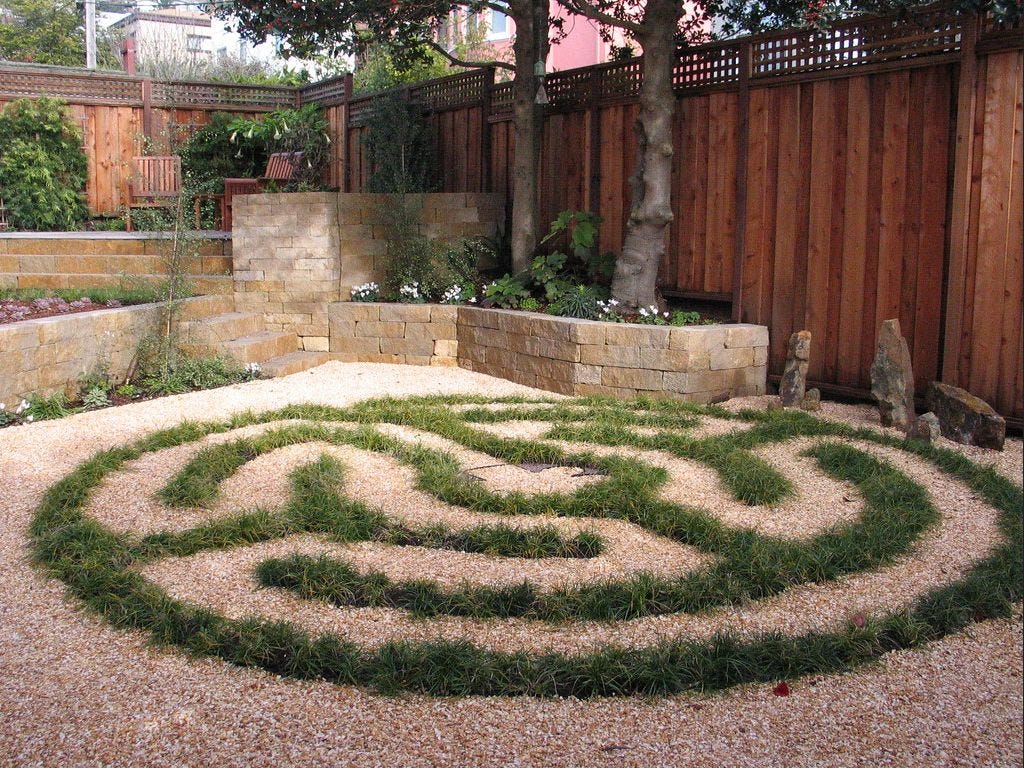Breakfast and Bare Feet: The Combo You Didn’t Know You Needed
Why do I start my day walking barefoot before breakfast? Let’s dig in (pun intended)!
Most Tuesdays, I go to The Farm, a local cafe, to write for the morning. As I was enjoying my Farm Benedict (the English muffin is replaced by a portobello mushroom-yum), a group of six women sat at the communal table with me. The group was talking about habits and their morning routines. One woman got up at 4 am each day to ride her bike for two hours, rain or shine; hats off to her…that’s definitely not in my wheelhouse.
A woman with short pink hair leaned over and asked me about my morning routine. I shared that I did some energy clearing and a barefoot labyrinth walk, followed by meditation and journaling. The thing that caught their attention was my barefoot walk.
Each component of my morning routine serves a purpose. The energy work recalibrates my subtle energy, the barefoot walk grounds me, meditation centers me, and journaling clears my mind. These things are automatic to me. I had to pause when they asked why those specific activities.
Grounding, also referred to as "earthing," is a practice of reconnecting the body to the Earth’s natural energy by making physical contact with the ground. Most often through your feet, but some lie down, and others use their hands. Walking barefoot on natural surfaces like grass, sand, or soil is the simplest way to ground. There are also grounding tools like mats or patches available, I do not have first hand experience with these as my preference is naked feet to the ground. Grounding is widely practiced consciously and subconsciously, for many it feels good, so they do it naturally. With much of our time spent indoors and around electronics grounding helps to restore balance to the body’s electrical systems, subtle energy, electromagnetic, and ionic.
What’s in it For You?
Balance and Connection: Putting your bare feet on the ground creates a natural connection to the Earth. Our bodies, being bioelectrical in nature, benefit from the Earth's negative electrons, this helps balance free radicals and reduce inflammation.
Decreased Stress: Research and anecdotal evidence suggest that grounding helps reduce stress, calm the nervous system, and promote relaxation by lowering cortisol levels.
Better zzz’s: Grounding has been linked to improved sleep quality. Some studies suggest that it helps regulate circadian rhythms and promotes deeper, more restorative sleep.
Reducing Inflammation and Pain: One of the key proposed benefits of grounding is its anti-inflammatory effects. The idea is that grounding allows the body to absorb negatively charged electrons, which neutralize free radicals and help reduce chronic inflammation, both of which are linked to pain and disease.
Boosting Immune Function: Our immune system benefits when inflammation and oxidative stress (the pesky free radicals) are decreased, allowing our body to manage infection more robustly.
Scientific Perspective
It’s still early days for scientific research -as it is with many natural and alternative practices. Early results show positive correlations to the benefits listed above. Studies have indicated that grounding can positively affect physiological processes, including reducing blood viscosity, which impacts cardiovascular health, decreasing inflammation, and improving mood and sleep patterns. The effects of subtle energy have not been studied, though some research projects are seeking funding to address this area.
Putting it Into Practice
I prefer keeping things simple: a quick walk or combining it with a walking meditation or mindfulness/gratitude practice. I also like to take a break outdoors picnic style, sitting in the grass or on a bench with my feet on the ground or walking barefoot on natural surfaces like grass, soil, or sand.
Sitting or lying on the ground while making direct contact with the Earth.
Grounding equipment, such as mats, blankets, or patches, are designed to mimic the effects of direct contact with the Earth.
I am a gal who loves to be barefoot, and luckily I live in an area that is warm year-round. It’s great to have skin-to-earth contact but wearing socks is a viable alternative. If you don’t like the feel of sand or grass on your feet or it’s too cold do what works for you. I have a client who gets a lot of snow, so she has a small patch of grass(like cat grass) she uses in the colder months.
These techniques are supposed to support your health and well-being, and to do that, they need to be fine-tuned to suit your life. What might be a fit for you?





